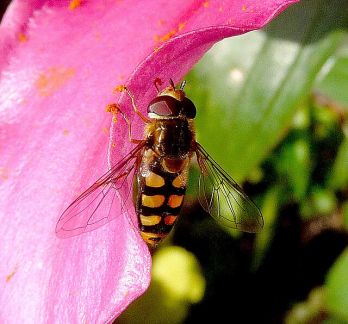Hover fly
Hover flies, also called flower flies, make up the insect family Syrphidae.
They are often mistaken for wasps and bees due to their appearance. However, they are harmless flies that have evolved to mimic more threatening behaviours.
Background
Hover flies are found throughout Australia in urban areas. They may appear in large numbers during hot weather, lingering in gardens to feed at flowers and seek shade.
They hover in the one spot, move suddenly forwards or sideways, and then hover again.
Impacts
Hover flies pollinate many plants and perform the useful role of ridding the garden of aphids. Many species lay eggs in aphid colonies and the larvae feed on the aphids.
Identification
Hover flies range from 8 to 20 mm in length, with slender bodies, large heads and eyes. They have a pair of clear wings and inconspicuous antennae.
Some hover fly species mimic wasps, including:
- a warning coloration of yellow and black, with bands of equal width
- a narrow waist
- the ability to perform a stinging action, by pushing the tip of the abdomen into your fingers if they are caught – this is a harmless defence mechanism.
Aphid-eating hover fly larvae are flattened, legless and maggot-like. Most are green or brown in colour, going unnoticed as they crawl over foliage in search of prey.
Lifecycle
Some hover fly species (Eristalis sp) lay eggs in stagnant water. These aquatic larvae have a long thin breathing tube, hence the common name, rat-tailed maggots.
Another species (Microdon sp) has a larval form that was initially classified as a mollusc, because it looks like a small slug. Microdon larvae survive by scavenging in ant nests, mimicking the ants' chemicals to escape detection by their hosts.

